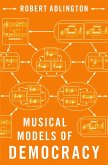Many scholars and music lovers hold that J.S. Bach is a modern figure, as his music seems to speak directly to the aesthetic, spiritual, or emotional concerns of today's listeners. But, by eighteenth-century standards, Bach and his music in fact reflected and forcefully promoted a premodern world and life view. In
Bach against Modernity, author Michael Marissen offers a new look at Bach that considers problems of inattentiveness to historical considerations in academic and popular writing about Bach's relation to the present. He also puts forward interpretive reassessments of key individual works by Bach and examines problems in modern comprehension of the partly archaic German texts that Bach set to music. Lastly, he explores Bach's music in relation to premodern versus enlightened attitudes toward Jews and Judaism and enquires into the theological character of Bach's secular instrumental music. Throughout, the book provides overlooked or misunderstood evidence of Bach's private engagement with religious and social issues that he also addressed in his public vocal compositions. Marissen ultimately argues that, while we are free to make use of Bach and his music in whatever ways we find fitting, we ought also to guard against miscasting Bach in our own ideological image and proclaiming the authenticity of that image, and hence its prestige value, in support of our own agendas.
Dieser Download kann aus rechtlichen Gründen nur mit Rechnungsadresse in A, B, BG, CY, CZ, D, DK, EW, E, FIN, F, GR, HR, H, IRL, I, LT, L, LR, M, NL, PL, P, R, S, SLO, SK ausgeliefert werden.









